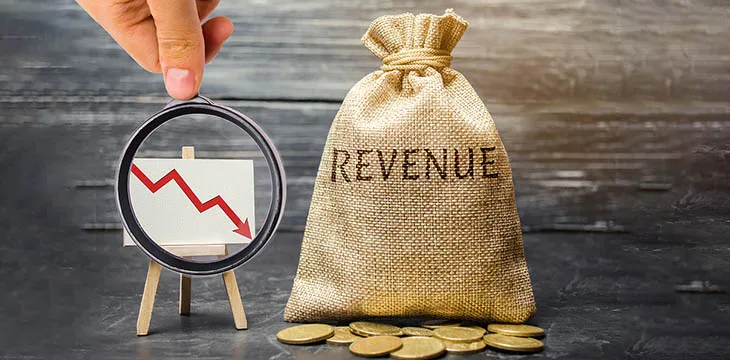|
Getting your Trinity Audio player ready...
|
Blockchain revenue has taken a 35% hit since 2018, a new report has revealed. The report attributed the hit to the 2018 digital currency winter that cast a shadow over blockchain adoption. The COVID-19 pandemic has also stalled several blockchain initiatives.
ABI Research, which published the report, estimates that the blockchain market has lost $2.8 billion in the past two years. Following the 2018 digital currency winter, over 2,000 token projects collapsed. This dampened blockchain adoption for many enterprises that began to have doubts about the long-term suitability of the technology.
However, according to ABI Research’s Michela Menting, this was a blessing in disguise.
She stated, “Many speculative offerings were purged from the marketplace. However, this will be relatively beneficial for the blockchain ecosystem overall, strengthening existing startups and ensuring sounder and more valuable business models emerge over the next few years.”
She expects the blockchain market to bounce back to pre-2018 profitability levels by 2023.
While COVID-19 slowed down adoption as it shrank the global economy, it also highlighted the inadequacies of current systems and how blockchain is a better alternative. Blockchain solutions targeting the supply chain and logistics sectors have been the biggest gainers, ABI Research revealed.
One of these is UNISOT, a Norwegian company that has been building Bitcoin SV-based solutions for the global supply chain. Its flagship product SeafoodChain targets the seafood industry, allowing every actor along the supply chain to trace the origins of their products. With Norway being the world’s second-largest seafood exporter after China, SeafoodChain is poised to power a $10 billion sector.
The ABI Research report also highlighted the rising prominence of blockchain technology in healthcare. The pandemic has exposed the shortcomings of the current global healthcare systems. Data storage and sharing has especially been challenged at a time when the lives of billions depended on it. Misinformation has also been rife, specifically on social media platforms, further making the case for blockchain adoption.
“Healthcare applications [of blockchain] are expected to increase faster than anticipated in light of the pandemic,” Menting remarked.
One of the most transformative healthcare applications is being built on the Bitcoin SV blockchain. EHR Data Inc. announced earlier this year that it had partnered with nChain to migrate 41 years of patients’ data to the BSV blockchain, giving patients ownership of their medical data. Since then, the company has been building a platform that’s finally challenging the health data silos structure that has existed for centuries. It will allow for real-time access to clinical data while allowing the patients to manage and even monetize it. EHR Data is specifically targeting the opioid crisis in the U.S., which is reportedly claiming the lives of 128 people daily.
As ABI Research’s Michela Menting observed, only blockchain applications that have a sound and valuable business model will last for the long haul. Kompany, a regtech company based in Vienna that’s changing global business verification is one of these. The firm addresses the critical issue of anti-money laundering through a multi-layer system known as KYC on-chain. Kompany is now building its solution on the BSV blockchain, having migrated from Ethereum as it’s slow, costly from a transaction fee perspective and unable to scale.

 07-14-2025
07-14-2025 





